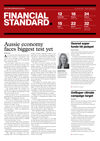Developing climate risks facing institutional investorsBY ELIZA BAVIN | THURSDAY, 17 APR 2025 3:29PMOrtec Finance has warned of the climate scenarios that threaten institutional investors in a new report. Ortec said the net zero by 2050 goal is no longer realistic and the physical risk because of rising temperatures and emissions is the most serious threat to asset performance and the financial system. "Following the warmest year on record, the Paris Climate agreement target of limiting global temperature rises to 1.5°C by the turn of the century looks increasingly unlikely," Ortec managing director, climate scenarios and sustainability Maurits van Joolingen said. "Even our most ambitious scenario does not anticipate the world reaching net zero until mid-2050 and shows temperatures rising to 1.6°C by 2100." Additionally, Ortec said the warming of the planet poses a risk to inflation and GDP. It said that by 2050 price levels will be 11% higher in the US and 6% higher in the UK in comparison to Ortec Finance's baseline (OF baseline) expectations. "Agricultural and labor productivity could suffer significantly as temperatures rise and long-term physical risk impacts increase. The combined effect could be highly inflationary to consumer prices," van Joolingen said. The High Warming scenario assumes the 2024 temperature spike will persist in the long term, further heightening risk and negatively impacting GDP. "Under this scenario, average global real GDP growth in the next 25 years is expected to drop to 1.1% - making it much harder for central banks to control inflation with monetary policy. This worsens in the following period up to 2070, where increasingly severe physical damage leads to almost zero real growth on average," van Joolingen said. The updated scenarios also highlighted how climate change could influence credit default rates during periods of market disruption, comparable to the GFC and dotcom crises. In the Delayed Net Zero scenario, they show an initial uptick in investment-grade corporate bond defaults in 2030, sparked by a sudden step-up in policy action; however, under the High Warming scenario, where there is a lack of sufficient policy action to limit climate change, the impact from 2038 onward becomes more severe, driven by the wider recognition of the scale of future climate risks. Under current climate policies, asset pricing is expected to come under pressure n the medium term, declining sharply in the 2030s for equities in the US and UK due to an emerging insurance crisis. However, investment returns from low-carbon and renewable energy technologies are expected to be more resilient across all successful low-carbon transition scenarios, the report found. "It is clear that under current policies, where there is hiatus in political willpower to reach net zero across large swathes of the developed world, temperatures will continue to break records," van Joolingen said. "As a result, physical risk poses the greatest threat to institutional investment portfolios and the stability of the global financial system. The recent surge in global temperatures and corresponding risk of triggering a range of climate tipping points, accentuates the potential downside even further." |


















